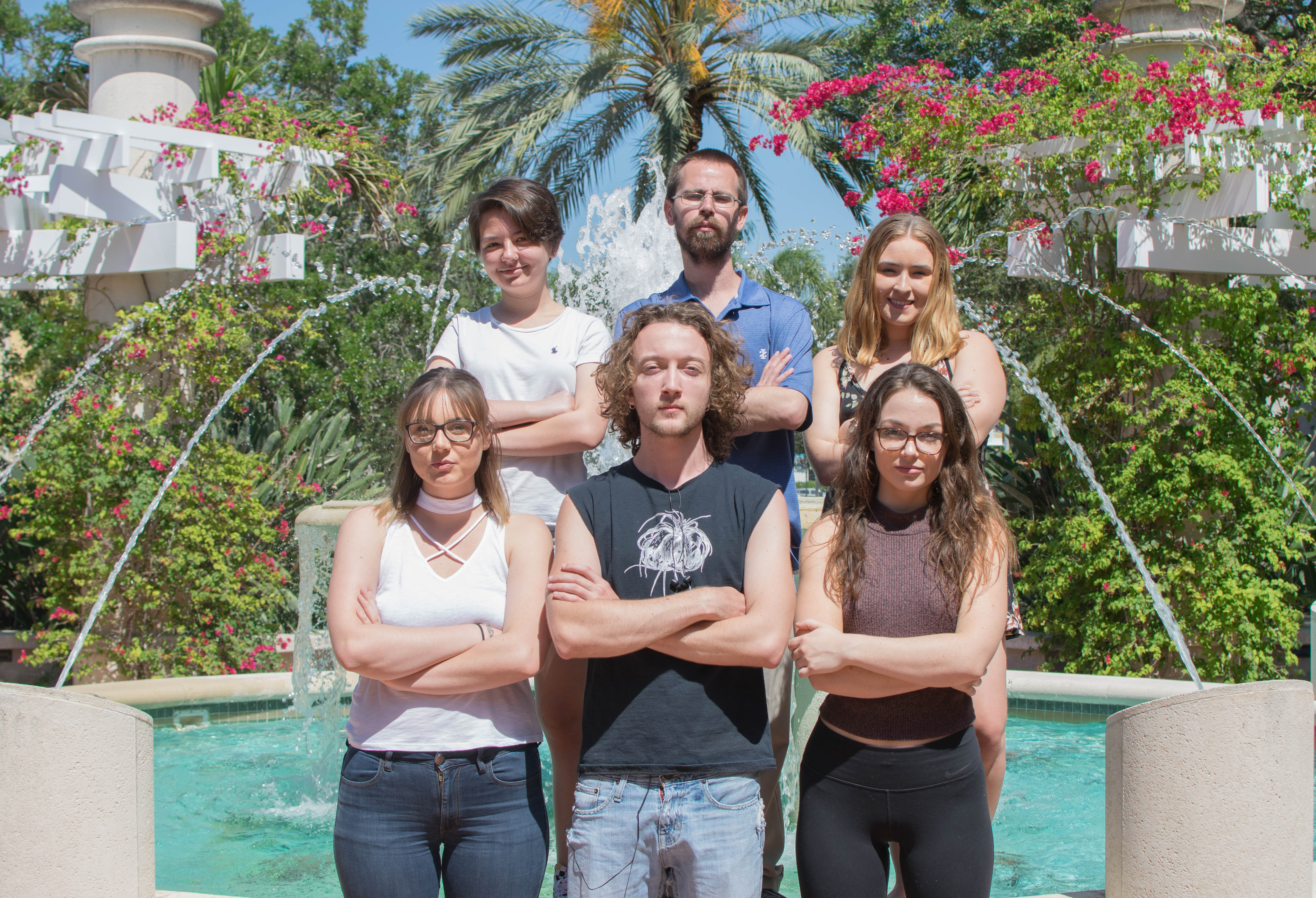Above photo: The Crow’s Nest’s editing team works tirelessly each week to put out USF St. Petersburg’s campus newspaper. A few members are pictured above (from top left to bottom right) Online Editor Emily Wunderlich, Editor-in-Chief Michael Moore, Creative Director Brianna Rodriguez, Managing Editor Whitney Elfstrom, Features & Opinion Editor Luke Cross and Arts & Life Editor Anna Bryson. Jonah Hinebaugh | The Crow’s Nest
This week is the one-year anniversary of a story that almost got us in trouble.
We broke the news that Samuel Goetz, then vice president-elect for Student Government, had resigned due to being named in a sexual assault allegation filed by a female student during the previous semester.
We reported on the story in a sensitive, fair and ethical manner — which is exactly what we explained to the two members of student government and the one staff member who showed up to our newsroom to scold us about how we shouldn’t have published the story.
Publishing the story was no different than what the Tampa Bay Times or any other professional news outlet would have done, we explained.
“You’re not the Tampa Bay Times,” we were told.
It wasn’t the first controversy we covered and it wouldn’t be our last. Maybe it shouldn’t have come as a surprise when, that same year, student government cut The Crow’s Nest budget by 15 percent, while virtually all other student organizations received an increase.
So goes the plight of the student newspaper.
How many countless campus newspapers have been attacked, ridiculed or censored under the thinly-veiled accusation that they aren’t a “real newspaper?”
How many have been threatened and harassed by administration?
How many have had their funding cut in retribution?
Ask any editor and they’ll tell you: student newsrooms are in trouble.
The Daily Campus, the nearly century-old independent newspaper at Southern Methodist University, announced earlier this month that it would stop printing in May and move under the control of the university’s journalism department.
That same week, The Independent Collegian of The University of Toledo released an editorial called “Our newspaper is dying.”
The Independent Florida Alligator responded with an editorial of its own and a movement: #SaveStudentNewsrooms. “Across the U.S., student-run newsrooms — just like professional newsrooms — are struggling to survive. They are hemorrhaging. But no one is talking about it,” the editorial read.
On April 25, what they are calling the “day of action,” the whole country will be talking about it. Coincidentally, it’s the one-year anniversary of the Goetz story that almost got us in trouble.
At the beginning of the school year, SG and administrators were in talks about potentially moving The Crow’s Nest under the control of the journalism department, much like what happened to The Daily Campus. Frank LoMonte, then executive director of the Student Press Law Center, was brought in to give a presentation to administrators and The Crow’s Nest staff about the importance of an independent press.
Thankfully, the talks stopped. But what if they hadn’t? We’ve printed since 1969, which is young in journalism years — but how close did that nearly 50-year tradition come to dying out? Or, at the very least, how close was it to being muzzled, silenced, censored?
We printed 200 copies less per week than the previous year. Our papers were flipped upside down, vandalized and abused. We were publicly lambasted by both SG and administrators for our coverage on a regular basis.
So far, we’ve survived. But for how much longer?
Due to the severe limitations of our budget, most of our staff only gets paid for around five hours of work per week. The reality is, most of us spend 30, 40, sometimes even 50 or more hours per week in the newsroom, around campus covering stories and taking photographs, or editing from home.
We are being pushed every year to phase out our print circulation in favor of becoming a strictly online publication. We are told every year that we need to rely more on ad revenue and less on students’ activities and service fees — but look around, just like the student newsrooms across the country that are dying, ad revenue is disappearing.
This year, the impossible happened and our budget was increased — but only after massive speculation and rumors of our print circulation being slashed amid a year that saw our readership grow substantially.
What happens when our readership takes a dip or we have an off year? Or worse, what happens when SG decides they just don’t care, that they’ve had enough or that they are sick of dealing with us?
It’s not just our problem. It’s a student newsroom problem. It’s why we must #SaveStudentNewsrooms.
We become journalists knowing that it’s a thankless job, but that doesn’t stop us from giving it our all and trying to bring you the best news possible. It doesn’t stop us from dropping everything at a moment’s notice, it doesn’t stop us from accepting the low pay and terrible hours, and it will never stop us in the quest to “seek truth and report it.”
We’re not the Tampa Bay Times, but we’re still a newsroom. So don’t stop us from being one.




“We reported the story in a sensitive, fair, and ethical manner.” If memory serves correct, you got in trouble for posting the victim’s name. Which is highly unethical and even “The St. Pete Times” is against such practices. And sensitive? You went to the victim’s residence uninvited seeking information (before blasting her name all over the story).
Yeah. Pretty sensitive. And ethical. All of that. And your failure to report that as it occurred just caused you to lose more credibility with this reader!